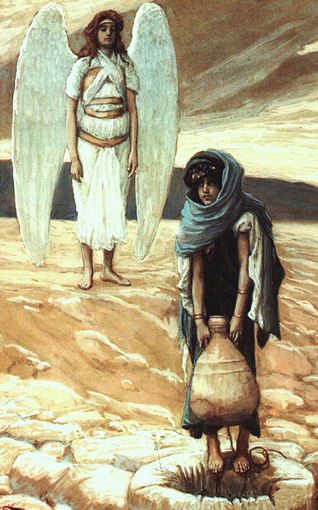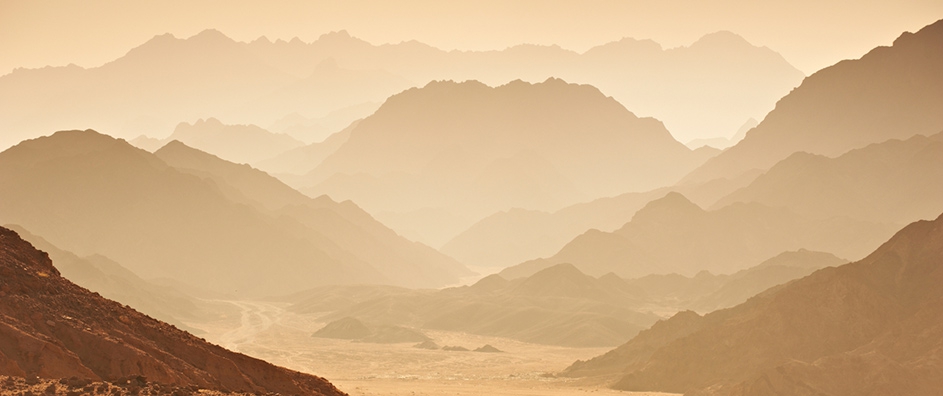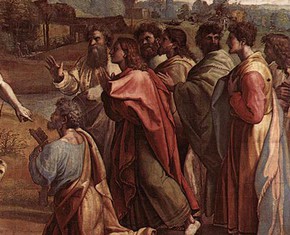The views expressed in our content reflect individual perspectives and do not represent the authoritative views of the Baha'i Faith.
The Old Testament and Muslim hadith agree in substance, though not in every detail, about what happened to Hagar and Ishmael after they left home.
Merging the two accounts creates a harrowing tale: Abraham didn’t just send Hagar and Ishmael off alone from Canaan; he went along to see the two of them safely to their destination. The trio traveled together until they reached a spot on the southwestern side of the Arabian Peninsula—the very place where the city of Mecca would someday sit.
When they reached the appointed spot, Abraham gave a leather bag of dates to Hagar as well as a skin of water. Bidding her farewell, he turned away and began the long trek back to Canaan, a journey of “forty camel days.” Hagar, horrified to be abandoned in such a barren place, chased behind Abraham, pleading with him, but he refused to stop. Realizing that her words were having no effect, she tried something else. She asked if this was what God had ordered. When Abraham said, “Yes,” she said, “Then He will not neglect us.’” – Genesis 21:14.
Resigned to her fate, Hagar returned to the spot where Ishmael waited with the water and dates. Abraham, meanwhile, moved steadfastly away until he was out of their sight. Then he stopped, raised his hands and prayed for his concubine and their son:
O our Lord! I have made some of my offspring to dwell in a valley without cultivation… in order, O our Lord, that they may establish regular prayer: so fill the hearts of some among men with love towards them, and feed them with Fruits: so that they may give thanks. – Qur’an 14:37.
Hagar and Ishmael stayed where Abraham had left them until the dates were eaten, the water in the skin was gone, and they grew weak from thirst. When Hagar could no longer bear to watch her son suffer, she left Ishmael in the shade of a bush. “Then she went off and sat down nearby, about a bowshot away, for she thought, ‘I cannot watch the boy die.’” – Genesis 21:15-16.
Hoping to see a person—or a cloud of dust from a caravan— Hagar climbed up the side of the nearest mountain and looked out over the empty valley. Thinking that things might look better in a different direction, she tucked up her robe and ran back down the mountain, across the valley and up the side of a second mountain. Again, nothing. In increasing desperation, she repeated her run from high point to high point, crossing the valley a total of seven times. Then:
She heard a voice and she asked herself to be quiet and listened attentively. She heard the voice again and said, ‘O, (whoever you may be)! You have made me hear your voice; have you got something to help me?’ And behold! She saw an angel . . . digging the earth . . . till water flowed from that place. – Bukhari, The Hadith of Bukhari, 3:55:583.
The spring gushed so freely that Hagar feared it might soon exhaust itself, so she began muttering “Zomë Zomë” or “stop flowing” while she scooped out a basin to keep the liquid from being lost in the desert sand. The name of the spring—ZamZam—is said to have come from those words. And its location marked the area where the city of Mecca (also known as Becca, Baca, or Bakkah) would someday stand.
Hagar and Ishmael were revived by the water and reassured by a final repetition of God’s promise. The angel of God then spoke to Hagar, saying,
What aileth thee, Hagar? fear not; for God hath heard the voice of the lad where he is. Arise, lift up the lad, and hold him in thine hand; for I will make him a great nation. – Genesis 21:18-20.
Hagar and Ishmael settled into their new life, and “God was with the lad; and he grew, and dwelt in the wilderness, and became an archer. And he dwelt in the wilderness of Paran.”

Hagar and the Angel in the Desert
The symbolic struggle faced by Hagar and Ishmael in adapting to a harsh life in a new land can be understood on at least three levels of mystical meaning.
First, it can be read as a parable about the growth of Hagar’s spiritual understanding. Hagar came from Egypt and from a polytheistic background. She had been given, perhaps against her will, to Sarah for a servant, and there is no indication that she had understood Abraham’s position in the same way Sarah did. Yes, she returned after her attempt at running away, but she continued to behave badly by allowing—or perhaps even encouraging—her son to mock Isaac. Only when she was ejected from Canaan and left to die of thirst in a wilderness—a nice metaphor for being spiritually parched—did she completely come to terms with her own need for a reviving draught of the water of life.
On a second level, the designation of Ishmael as an archer can be understood to mean that he was a saintly man who was able to shoot “sure arrows of knowledge” that affected the hearts of those who lived in the wilderness of ignorance. The Qur’an reinforces this understanding of Ishmael’s spirituality by describing him as an admirable apostle who “used to enjoin on his people Prayer and Charity, and he was most acceptable in the sight of his Lord.”
Third, the way that Hagar and Ishmael settled in “the wilderness of Paran” is seen by Islam and the Baha’i teachings as a prophecy about Arabia and the advent of Muhammad. This is because Paran was a town along the northwestern border of Arabia, and thus any mention of it can be taken to indicate the whole of Arabia, much as the term Ur of the Chaldees was used to designate a much wider area than the city of Ur itself. As Abdu’l-Baha notes, it can also mean, in a mystical sense, the whole of time:
…regarding the Covenant entered into on Mount Paran, this signifieth that in the sight of God the past, the present and the future are all one and the same — whereas, relative to man, the past is gone and forgotten, the present is fleeting, and the future is within the realm of hope. – Abdu’l-Baha, Selections from the Writings of Abdu’l-Baha, p. 206.
Next: Building the First House of Worship—Ever
















Comments
Sign in or create an account
Continue with Googleor